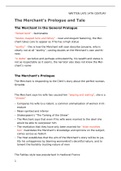Summary
Summary The Merchant's Prologue and Tale: A Star Quotes and Analysis
A full chronological summary of The Merchant's Prologue and Tale by Chaucer, with the most useful quotes analysed in detail by an A star student, with context and extra essay knowledge
[Show more]




